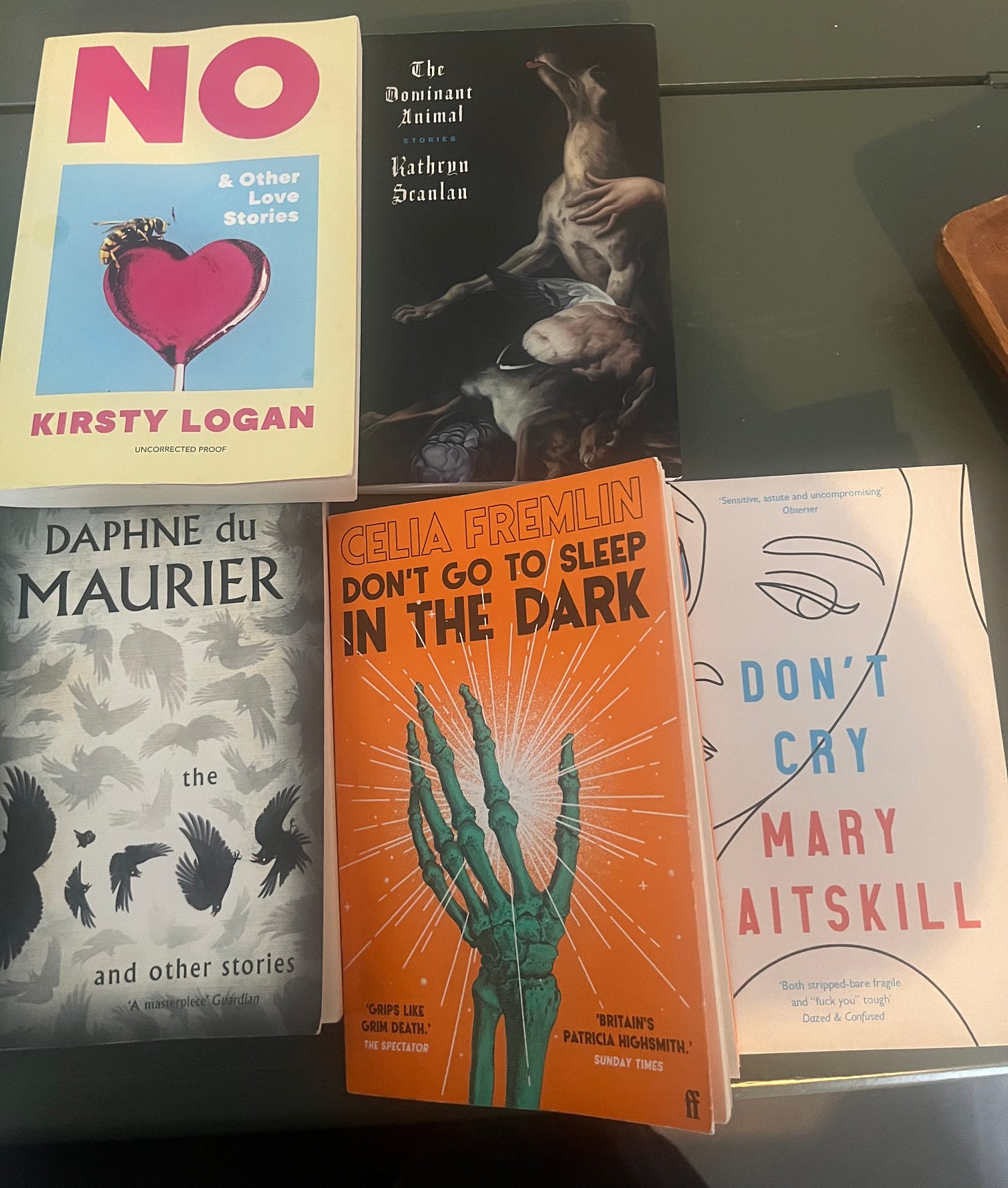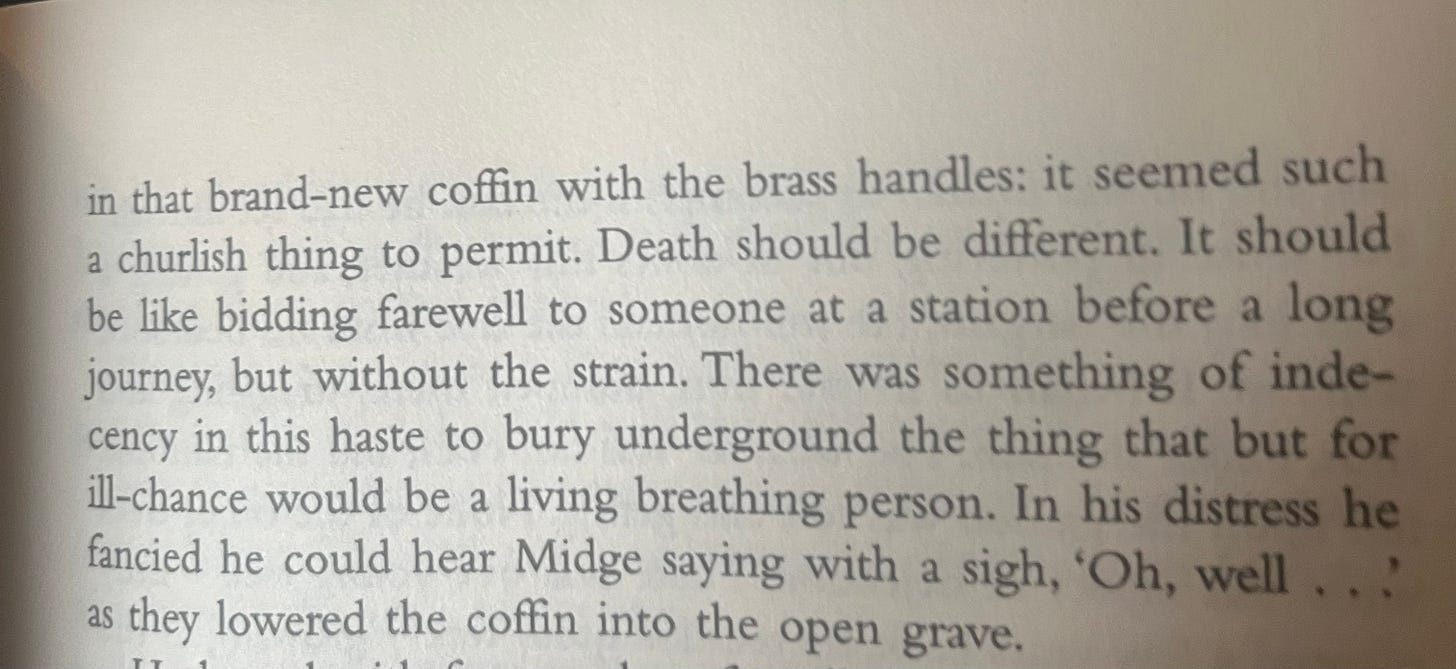Today my second short story collection, The Coiled Serpent is out in paperback in the uk ( it came out in north america last month, if you are there you can buy it with unnamed press) and I’m making headway on my third collection, so I wanted to highlight some collections i’ve been reading lately and love. Daphne du Maurier’s The Birds and other stories, Celia Fremlin’s Don’t Go to Sleep in the Dark, Don’t Cry by Mary Gaitskill ,The Dominant Animal by Kathryn Scanlan, No by Kirsty Logan. I think people in Britain in particular are hesitant to read short stories, as if they don’t believe they can have an intense or even life changing experience of art in such a short period of time, though you can look at a painting for 10 minutes and have exactly that. Reading a collection is like wandering around a museum, especially in these authors as their work is beautifully visual, but like a museum you can carry around in your bag. Last week I was on a panel on Daphne du Maurier at the London Library and all of us mentioned at one point in the talk, The Apple Tree, a lesser known story of hers in the same collection as The Birds ( which as you probably know was the basis for the Hitchcock film of the same name). It has become one of my favourite Daphne stories because it manages to be deeply creepy and spooky without leaving the realm of the possible. There is a strange tree in it, but never does it not behave like a tree normally does. It is also very funny, which I don’t think Daphne gets enough credit for, along with her acute eye for pettiness and humiliation. I have gotten into the habit of saying “oh well” to myself in a creaky voice, after this excerpt here, especially when things in my life aren’t going as I want them too, or I fuck up, which is 80 percent of the time.
I read Kathryn Scanlan’s Kick the Latch earlier this year, followed by a few of her stories on the Granta website and the Dominant Animal is wonderful. It has the best story about constipation I have ever read. A story I think about a lot after reading it too is College Town, 1980 in the Gaitskill collection. All of these collections are by women and I think they do capture something interesting, pathetic, tragic, funny, about being such. There are fewer contemporary British male short story collections than there are novels(or poetry collections) that is for sure, perhaps down to fact short story collections give less cultural cache but generally there are not a lot of spaces for the short story in Britain, especially with the death of a magazine like The White Review. Last month, I spoke at the Short Story Festival in Cork, and cannot help but fantasise about the UK having a short story festival too. It was exciting. I got to interview Sara Baume and Derek Owusu two writers i admire greatly. I also judged a short story contest, Seán Ó Faoláin International Short Story Competition and opened the reading of my winner, Jack Kennedy for his great story, Snap. It was no surprise when reading the biographies of the winner and shortlistees after I had made my decision, that the winner described himself as a voracious reader. You can tell, because reading is the best and most simple way to becoming a good writer and it feels like that still needs to be reiterated( besides the fact reading is pleasurable and fun why wouldnt you) Literature courses at universities are shrinking while creative writing programs seem to be growing. ( not that any writer needs to go to university, they just need a library card) writing a book or a story or poem is adding to a giant quilt other writers have also worked on and in conversation with them( literature is the magical way you have conversations with the dead! which is why the daphne du maurier panel was such incredible fun, why don’t we do events like this for deceased authors more often??)
while i was in london i went to an exhibition at the warburg institute as it reopened and i wanted to at least see in the foyer of the building i learned so much about back in my art history days, the exhibition was about Warburg, his collection and his moving to the uk but alot of the exhibition was taken up with contemporary photography ( something i noticed at the bronte parsonge last year too) why can’t we just learn and experience and even enjoy aspects of the past without relating it back to our contemporary selves or dominating the conversation with the past. this is why i love the biology section in the horniman museum in south london and hope it never changes, it lets you walk directly into the past.
Also out today, is the reissue of The Fate of Mary Rose, by Caroline Blackwood, which I wrote the introduction for. It delves into womanhood in such a brilliant, dark way too. i wonder if her and daphne ever met.
I think out of loneliness, and having access to a television I have become completely addicted to British Big Brother. My favourite person on it is Lily, because she is an abject, misbehaving young woman. Her socks are filthy, she burps, screams and steals food. I went off social media (instagram) at least partially because the demands of female perfection on there, both in body, morals and lifestyle. I like watching television as an alternative to social media because at least on this television, there is no endless choice, I have about six channels. I watch old episodes of Poirot and Sherlock Holmes, and big Brother, and sometimes a show about hotel inspections, the people on it craggly and weird and living in decrepit English sea side towns. Besides big brother, all the other shows are at least 10-15 years old, if not older.





I've already enjoyed The Coiled Serpent in hardback, Camilla – wonderful. I love your recommendation for Kathryn Scanlan's collection: "It has the best story about constipation I have ever read." That's going on my shopping list!
Seán Ó Faoláin! Such a tremendous writer. I haven't read him for 40 years. I will remedy that immediately.